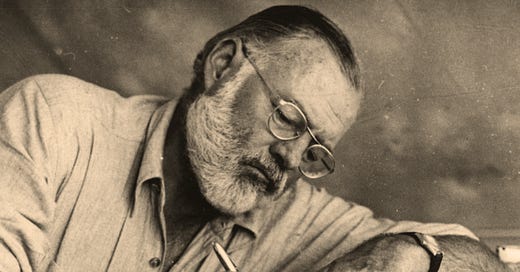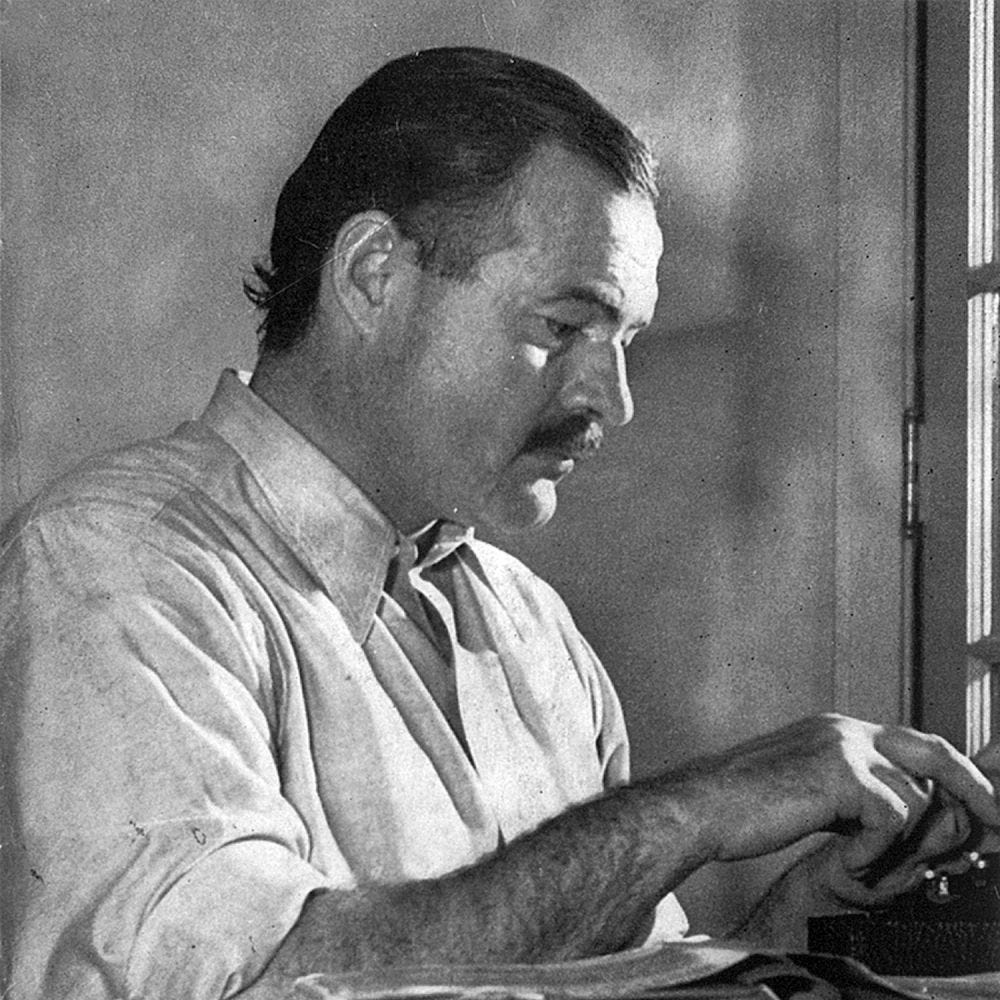Welcome to Mental Garden. The following letter is part of our "Notes on giants" collection, in which we explore the thoughts of humanity's greatest minds.
To see the full library, click here.
🏷️ Categories: Writing, Creativity, Habits
Ernest Hemingway, one of the most important figures in 20th century literature.
I am struck by his way of writing and his way of life. He was a great adventurer and a master of clear and concise prose. He was a peculiar person - like all of us who like to write. I recently finished his work The Old Man and the Sea and that made me want to get to know him better until, finally, I managed to satisfy my curiosity by reading an interview he gave in 1954 in which he talked about his life as a writer.
His writing routine fascinated me and that's when I asked myself, ‘what could I learn from this great writer and apply it to my life?’
Here is the answer.
Morning ritual
Hemingway had a ritual that was sacred, as he said, ‘I write as soon as I can after sunrise’ (Hemingway, 1954).
The reason was simple: getting up so early allowed him to take advantage of the quiet of the morning, when there is no one to disturb you and the atmosphere is calm. It is at these times that he could really concentrate on the absolute silence and the mental clarity that comes from being fresh and newly risen.
Sometimes, he would start at 6am and continue until noon.
Now that's making the most of the morning.
The art of starting off on the right foot
His writing process was simple but very effective.
At the start of each day, as the sun peeked over the horizon, he would review what he had written the day before, retrace his steps and rewrite the text. ‘I always rewrite every day to the point where I stopped,’ he said. The rest of the day he would continue to write new text, which would be revised the next morning.
With this habit, Ernest ensured that each session started with a solid foundation.
Rewrite the previous day and write new text, and so on each day.
Knowing when to stop writing
This is one of the things that surprised me the most.
When Ernest had already spent several hours writing and was already feeling tired, he would stop just when he knew how he was going to continue the story.
“Write and then read what you have written until you get to a point where you still have juice left to squeeze out and you know what is going to happen. Stop there and try to live until the next day, until you write again” (Hemingway, 1954).
This allowed him to always keep inspiration alive, day after day, without fail.
“It is the wait until the next day that is hard to overcome.”
That is how inspired and motivated he felt to get up early the next day and write.
Track your habit
Hemingway did something similar to Jerry Seinfeld's method for staying motivated.
He liked to keep a record of his daily output, so he wouldn't fool himself about his productivity and he could better understand how his energy fluctuated. He would write down the number of words he had written; “450, 575, 462, 1250 and 512… The higher numbers were days when I worked hard so I wouldn't feel guilty about spending the next day fishing” (Hemingway, 1954).
I have to admit that I feel tremendously identified with this last sentence…
Sometimes, the inner voice is too self-demanding and we punish ourselves harshly.
How to deal with writer's block
Writer's blocks are inevitable, the crucial thing is to know how to deal with them.
When the words weren't flowing, Hemingway would take a break from fiction to answer letters or do anything else that would give him a break from the "terrible responsibility of writing," as he put it (Currey, 2013). I did something similar, and I called it "indirect procrastination," a way of moving forward when we don't want to move forward.
But Hemingway wasn't the only one, Isaac Asimov, one of the most prolific writers in history, had a very similar attitude toward writer's blocks.
As you get to know yourself more and more, you'll find your tricks to avoid getting blocked.
One thing is clear: writing is an art.
There are no exact formulas or infallible methods.
There is only a path of self-exploration in which you pour out your way of being on paper. Hemingway's habits are part of his work of self-exploration and can inspire us to begin our path, but never forget, what works for one artist may not work for another. That's why it's art and not science.
Write, lose yourself in your words and, over time, you will begin to make your way.
Nothing else to say.
✍️ Your turn: What habits do you practice in your writing process?
💭 Quote of the day: “The story wrote itself, and I had a hard time keeping up.” Ernest Hemingway, A Moveable Feast.
See you soon! Write in the meantime. 👋
References 📚
Currey, M. (2013). Daily rituals: How Artists Work. Knopf.
Ernest Hemingway, The Art of Fiction. (1958). The Paris Review. https://www.theparisreview.org/interviews/4825/the-art-of-fiction-no-21-ernest-hemingway








Great post thank you!
Having that daily ritual of time use is really valuable as it helps you click into writing mode or any kind of activity automatically. Having the body sit you down at the desk or the musical instrument or the easel overcomes that initial resistance/fear that you might have in tackling the task at hand. Also, Hemingway's stopping with some idea of where his story goes next clicks in the process of musing about that idea overnight. It gives him time to think deeply about that next section of the story.